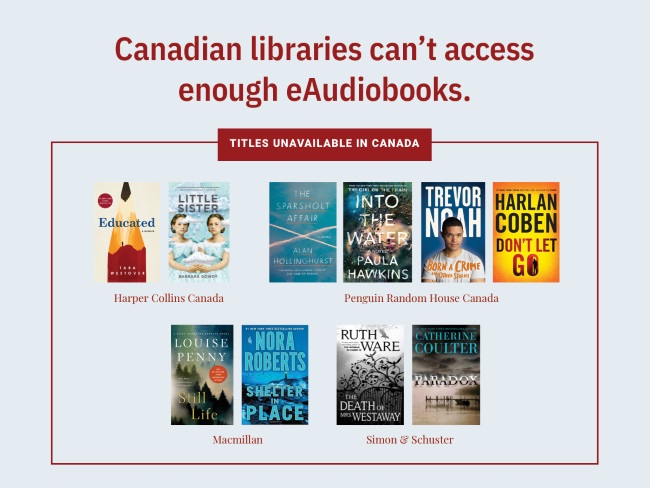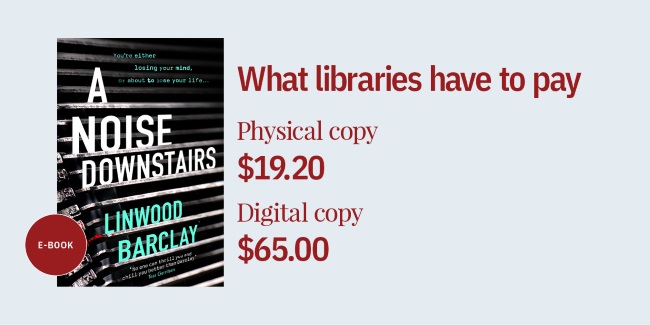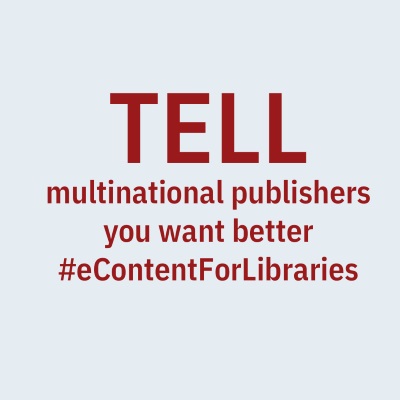
Canadian Urban Libraries Council (CULC) Launches #eContentForLibraries Campaign
January 14, 2019
The Canadian Urban Libraries Council (CULC) today launched the #eContentForLibraries campaign.
Over the next two weeks, the campaign will highlight two issues:
- eAudiobook access. Demand for eAudiobooks is skyrocketing, but major multinational publishers aren’t making a number of best-selling titles available to Canadian public libraries – including some prominent Canadian and Indigenous works.
- Excessively high price points and restrictive purchasing models for eAudiobooks and eBooks.
The Canadian Urban Libraries Council is asking Canadians to help resolve issue by demanding stronger #eContentForLibraries of major multinational publishers: Hachette Book Group, HarperCollins, Macmillan, Penguin Random House and Simon & Schuster.
In addition to the #eContentForLibraries campaign website, CULC has provided libraries with a campaign toolkit that includes:
- Campaign overview
- Press release
- Key messages
- FAQs
- Social media calendar
- Graphics library
News Release: Canadian Public Libraries Call on Multinational Publishers to Make More Content Available
Lack of Availability, High Prices Stand in the Way of Open, Easy Access to eBooks and eAudiobooks for Canadian Readers at Public Libraries
Toronto, Jan 14, 2019 – Wondering why more eBooks and eAudiobooks aren’t available to borrow? So are Canadian public libraries.
Demand for eAudiobooks is skyrocketing, but major multinational publishers aren’t making a number of best-selling titles available to Canadian public libraries, including some prominent Canadian and Indigenous works.
eAudiobooks currently unavailable to Canadian libraries.
Another issue is excessively high prices and restrictive purchasing models for eAudiobooks and eBooks. Libraries lend digital copies just like physical books – on a one-to-one basis. But the prices public libraries pay for digital copies are exponentially higher.
Price discrepancies between physical and digital copy
“Public libraries are crucial to a vibrant publishing industry. We introduce Canadians to new titles and authors. We have significant purchasing power. These challenges are jeopardizing our ability to provide universal access to content in all its forms, including those who may not be able to visit a library branch or read print materials due to illness or disability,” said Vickery Bowles, City Librarian, Toronto Public Library. “We know Canadians love their libraries and care deeply about these issues, and are asking everyone to help us get this message across to major multinational publishers.”
The Canadian Urban Libraries Council is asking Canadians to help resolve these issues by demanding stronger #eContentForLibraries of major multinational publishers: Hachette Book Group, HarperCollins, Macmillan, Penguin Random House and Simon & Schuster.
Help us spread the word for better eContent
Fast facts
- Digital content is the fastest growing area of borrowing for public libraries. Spending by Canada’s largest urban libraries increased by more than 45% since 2014 and continues to grow.
- eAudiobook sales are increasing by double digits each year and, in the last three years, use at six of the largest Canadian public libraries grew by 82%
- Overdrive, the leading provider of eBooks and eAudiobooks to libraries, reported a 24% increase in eAudiobook circulation in Canadian libraries from 2016 to 2017 alone
***
The Canadian Urban Libraries Council is a national library group dedicated to working collaboratively to build vibrant urban communities by strengthening the capacity of Canada’s urban libraries. Our 45 member systems operate almost 700 points of access, and in 2017 were used by citizens more than 385,000,000 times. They represent approximately 80% of the country’s public library activity. They employ more than 12,000 Canadians; and purchase more than $100,000,000 of materials each year.
Key Messages
- Wondering why you can’t borrow more eAudiobooks and eBooks? So are Canadian public libraries.
- Demand for eAudiobooks is skyrocketing, but major multinational publishers aren’t making a number of best-selling titles available to Canadian public libraries, including some prominent Canadian and Indigenous works.
- Another issue is excessively high prices and restrictive purchase models for eAudiobooks and eBooks. Libraries lend digital copies just like physical books – on a one-to-one basis. But the prices we pay for digital copies are exponentially higher.
- Libraries have significant purchasing power. We are crucial to a vibrant publishing industry. We introduce Canadians to new titles and authors. These challenges are jeopardizing our ability to provide universal access to content in all its forms to all of our users, including those who may not be able to visit a library branch or read print materials due to illness or disability.
- The Canadian Urban Libraries Council is asking Canadians to help resolve issue by demanding stronger #eContentForLibraries of major multinational publishers: Hachette Book Group, HarperCollins, Macmillan, Penguin Random House and Simon & Schuster.
- Visit econtentforlibraries.org and voice your concerns directly to the big publishers who have the power to fix things.
Frequently Asked Questions
Why can’t libraries buy more eAudiobooks and eBooks?
- Major multinational publishers aren’t making a number of best-selling titles available to Canadian public libraries in eAudiobook format– including some prominent Canadian and Indigenous works.
- Excessively high prices and restrictive purchasing models for eAudiobooks and eBooks. Libraries lend digital copies just like physical books — on a one-to-one basis. But the prices we pay for digital copies are exponentially higher.
Are eAudiobooks growing in popularity?
Yes, eAudiobook sales are increasing by double digits each year and, in the last three years, use at six of the largest Canadian libraries grew by 82%. Overdrive, the leading provider of eBooks and eAudiobooks to libraries, reported a 24% increase in eAudiobook circulation in Canadian libraries from 2016 to 2017 alone.
Why can’t libraries buy some of the eAudiobooks their customers want?
While both Canadian multinational and independent publishers are starting to produce their own eAudiobooks, rights to their titles may be sold to U.S. producers and are not available in Canada. If they are sold to Audible, the U.S. eAudiobook subscription service that moved into Canada in 2017, they cannot ever be purchased by libraries. These include Giller nominees and Canada Reads titles.
Do many people read eBooks?
Digital content is the fastest growing area of borrowing for public libraries. Spending by Canada’s largest urban libraries increased by over 45% since 2014 and continues to grow.
How are public libraries responding to this demand, given the high prices set by multinational publishers?
Public libraries have responded by reallocating budgets and opening conversations with publishers to resolve issues with supply and discoverability. Public libraries have had to reallocate budgets to digital content while continuing to fund their physical collections. This puts pressure on finite resources and is not sustainable. Libraries have attempted to work with the multinational publishers to develop a purchasing model that works for both sides, but with little success.
Why are eBooks and eAudiobooks treated differently than print books?
Print materials are purchased as physical copies that the library owns. Rights holders typically license – rather than sell – access to digital resources. As licenses are contracts, libraries receive the rights specified in the agreements including caps and time limits on eBook and eAudiobook use.
Does this mean that the library doesn’t actually own the eBook or eAudiobook?
Yes. Libraries purchase licenses for eBooks and eAudiobooks – we don’t own them, which is another issue for long-term access.
How do you want people to respond to this campaign?
We want as many people as possible to visit econtentforlibraries.org to learn about the issues public libraries face with respect to access to eAudiobooks and pricing for eBooks and eAudiobooks.
We’re asking people to spread the word on social media with the hashtag #eContentForLibraries so we can track the conversation and voice their concerns to the publishers.
We will share the response to this campaign with stakeholders including other public libraries, government and multinational publishers.
We also want people to keep borrowing eBooks and eAudiobooks from public libraries. The booming popularity of this content is one of the strongest arguments for increased access.
Publishers are going through a tough time. Are high prices and limited access justified?
We recognize publishing in Canada and around the world is undergoing great change, but limiting access and imposing unreasonably high prices for eBooks is not the answer.
Public libraries play an integral role in a vibrant book industry. We promote literacy and a love of reading that encourages people to acquire more content of all varieties, both borrowed and purchased.
Has anything else been done to achieve fair pricing and improved access?
Advocacy efforts for fair pricing and access have been underway in Canada since 2010. There has been significant progress with much improved access to eBooks for public library customers. Many Canadian independent publishers make their content available as do the major publishers. However, multinational publishers continue to limit access to eAudiobooks and impose terms such as unreasonably high prices.
Who are the multinational publishers the campaign refers to?
The “Big Five” publishers are Hachette, HarperCollins, Macmillan, Penguin Random House and Simon & Schuster. Together these companies control roughly two-thirds of the North American consumer book publishing market.
What about independent publishers?
We do not face the same access and pricing issues with independent publishers.
Do public libraries in Quebec face the same pricing issues?
Public libraries in Quebec face the same access and pricing issues when it comes to the “Big Five” publishers. However, Quebec publishers make their eBooks available at reasonable prices, much as independent publishers do in the rest of Canada.
What about fair compensation for authors?
We support fair compensation for authors and we are not suggesting we should be paying the consumer price. What we are saying is that unreasonably high eBook and eAudiobook prices mean we are increasingly limited in what we can purchase. We have to spread our budgets across both print and digital purchasing, which means buying popular material in both formats. This impacts authors, as we are buying fewer titles, especially those by new or lesser known writers.
What will happen if access doesn’t improve and prices don’t come down?
Public libraries will not be able to fulfil their core mandate of providing universal access to information to all. We will not be able to buy sufficient copies of popular titles to meet demand, or offer access to all titles in the formats people desire. And this will impact people who rely on us the most – those with a limited income or disability.
Publisher eBook Pricing Model for Libraries Hachette One copy, one user, perpetual ownership HarperCollins Copies must be repurchased after 26 checkouts Macmillan Earlier of 52 checkouts or 24 months Penguin Random House 24 months Simon & Schuster 12 months



Add a new comment